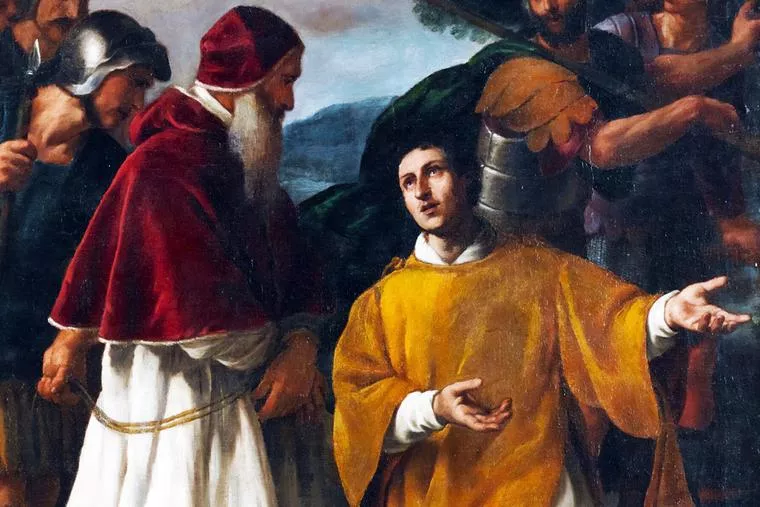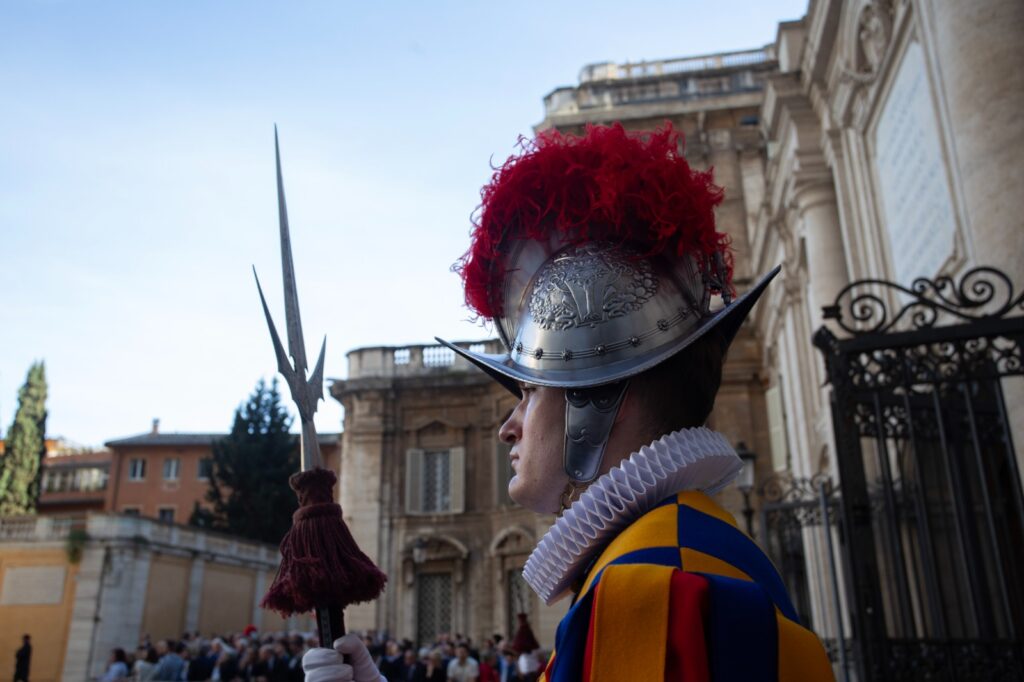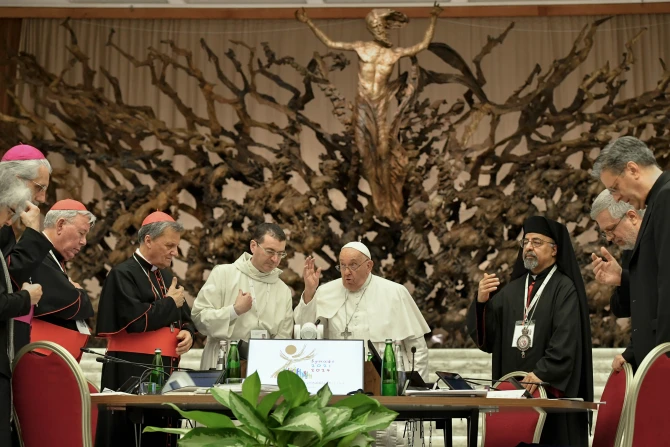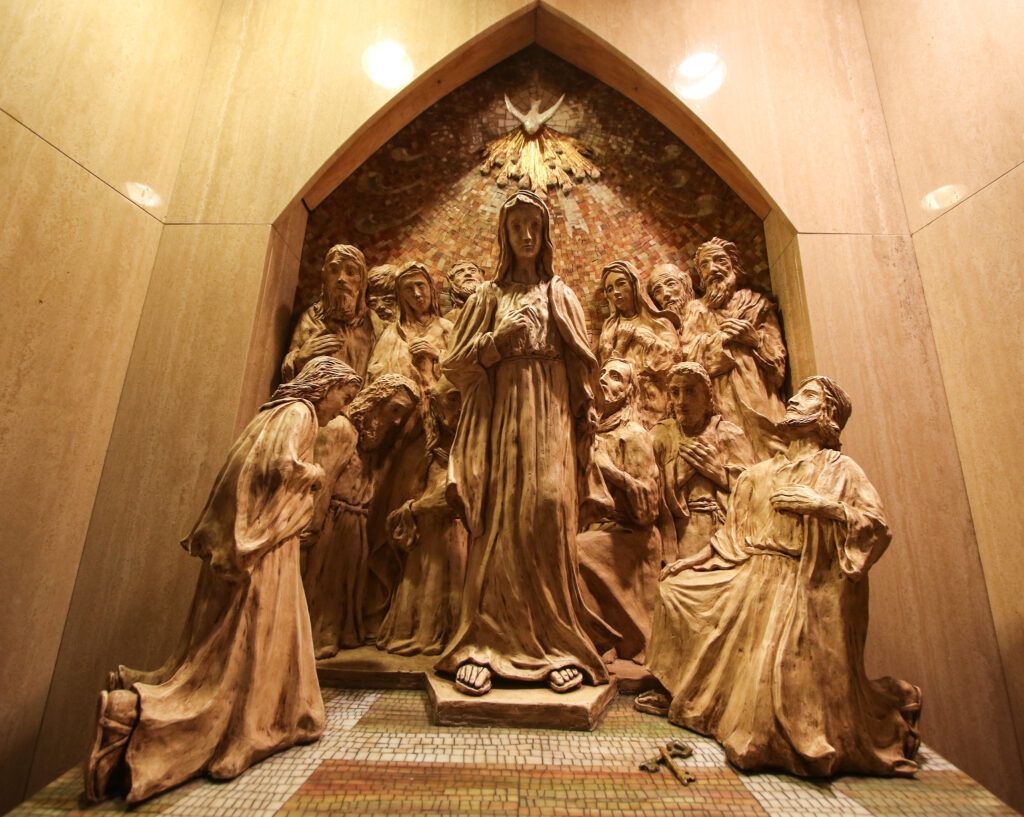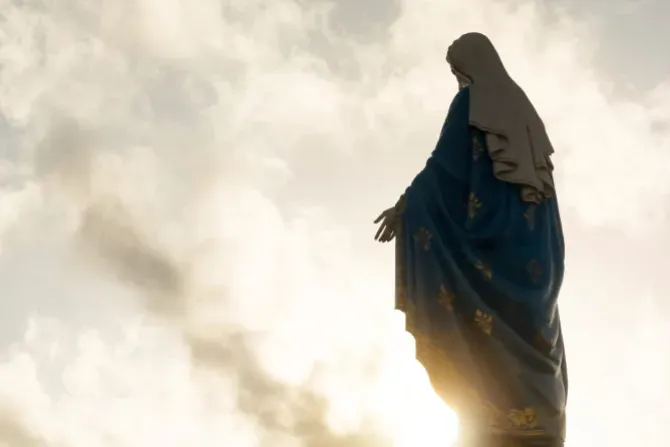By Robert Klesko
I’ve been a deacon for only a relatively short time. However, in that short time, a key topic of conversation with my Latin Rite friends and acquaintances has been my title. In the Christian East, deacons are properly styled “Father Deacon” (or simply “Father”). At the Melkite Church where I serve, people call me Abouna — Arabic for “Our Father.”
In the limited times that I’ve introduced myself to my brother Western Catholics as “Father Deacon,” I’ve been met with confusion at best and incredulity at worst. There seems to be an attitude of repulsion for any association of the diaconate with the title “Father.” What does this confusion reveal about the state of our collective understanding concerning the diaconate? And what do we still need to understand?
Vatican II and the Restoration of the Diaconate
It’s been nearly 60 years since the close of the Second Vatican Council. A fruit of the Council was the call for a full restoration of the diaconate (no longer seen merely as a transitional state toward priesthood) in the permanent hierarchy of the Church.
In 1967, Pope St. Paul VI promulgated Sacrum Diaconatus Ordinem, which established the general norms for the restoration of the diaconate and called on national episcopal conferences to establish particular norms for diaconal formation. This restoration is theologically rooted in the unity of the sacrament of Holy Orders. The three major Orders of the episcopacy, presbyterate and diaconate constitute the single sacrament of Orders.
As Lumen Gentium 26 reminds us, bishops are “marked with the fullness of the sacrament of Orders …” The priesthood shares this to a lesser degree and depends upon the cooperation and authority of the bishops (LG 28). Finally, the diaconate, sharing in the lowest degree, is ordained “unto a ministry of service” (LG 29) in imitation of the diakonia of Christ.
As such, each ministry in the sacrament of Orders is a sharing in the ministry of spiritual fatherhood. As Christ the one High Priest makes the Fatherhood of God present to the world through the Paschal Mystery, so too does each ministry (bishop, priest, deacon) make the Fatherhood of God present in the means proper to each ministry.
Deacons Aren’t Just Social Workers
The spiritual fatherhood of the diaconate is a theological mainstay of the East. Unfortunately, the envisioned restoration of the diaconate à la Vatican II was more heavily influenced by Protestantism rather than Eastern Christendom.
Protestant biblical scholarship in the 19th century, seeking to distance itself further from any Catholic understanding of ordained ministry, translated the term diakonia as “humble service to those in need.” No doubt that charitable service toward those in need is an aspect of diaconal service (like, for example, St. Lawrence who distributed alms to Rome’s poor), but to limit the diaconate to corporal works of mercy is to limit the deacon’s fatherhood severely.
The dominance of this strain of Protestant thought concerning the diaconate has caused many Catholics to view deacons as Church-appointed social workers and therefore an optional ministry in the Church or one that can be served by non-ordained laypeople.
Deacons Are Emissaries
The unfortunate limiting of the diaconate to works of service has obscured the historic and far more robust understanding of the diaconate in terms of the deacon as emissary.
In his wonderful paper entitled “Deacons: Emissaries of the Kingdom” (available in the EWTN online library), Father Deacon Anthony Dragani reminds us that diakonia was historically understood as “service on behalf of a higher authority.” A diakonos was one who was sent to fulfill the commission of a king or emperor. Theologically this identification was translated to the diaconate as demonstrated by the close connection between the diaconate and episcopacy. Frequently in Church history, we see deacons acting as official messengers of bishops and even as presidents of ecumenical councils. Think, for example, of the key role of St. Athanasius at the Council of Nicaea (he attended as a deacon as the official theologian of the patriarch of Alexandria).
This intimate connection between the bishop and the deacon is attested to in the third-century Didascalia Apostolurum:
Let the bishops and the deacons, then, be of one mind; and do you shepherd the people diligently with one accord. For you ought both to be one body, father and son: for you are in the likeness of the Lordship. And let the deacon make known all things to the bishop, even as Christ to His Father. But what things he can let the deacon order, and all the rest let the bishop judge. Yet let the deacon be the hearing of the bishop, and his mouth and his heart and his soul; for when you are both of one mind, through your agreement, there will be peace also in the Church.
St. Ignatius of Antioch, in his Letter to the Trallians, also places the deacons close to the bishops as “an appointment of Jesus Christ, and the bishop as Jesus Christ …” The Trinitarian language used testifies to the close association of the work of the deacon with the fatherhood of the bishops. One might say that the deacon makes the fatherhood of the bishop present in his absence. This survives even today liturgically at hierarchal/pontifical liturgies where the bishop is attended to by two deacons. Even in non-hierarchal liturgies in the East, it is the deacon who prays for the Hierarch in the various litanies.
What’s in a Name?
With all of this being said, what does the contemporary Western title “Rev. Mr.” communicate to the faithful? Does it communicate that a deacon is an emissary and close collaborator of the bishop? I don’t think it does. To me, “Rev. Mr.” communicates perfectly the confusion that the Church has about the diaconate. It sounds like a halfway title — something that is given to a man who is somewhere between a full cleric and a layman.
Yes, I know that “Rev. Mr.” is relegated to the transitional diaconate, with permanent deacons being styled simply “Deacon.” I do not think this helps — nor does the hard line drawn between permanent and transitional deacons. A deacon is a deacon is a deacon.
The diaconate will never be fully re-implemented as the Council called for if we hang onto language that is not helpful for understanding and does not communicate the reality of the ministry of the deacon.
Titles are important. They communicate to us. We have to get titles right because often people do not think more deeply than a title. A title, in many ways, is a small catechesis. We call bishops “Lord” or “Master” — the English Catholics call bishops “Lord” and they are called “Master” in the East; I’m not sure how helpful “Your Excellency” is, but that’s another article — because they are the icons par excellence of Christ and make present the Fatherhood of God in a preeminent way. We call priests “Father” because they, under the authority of the bishops, are spiritual fathers of the flock they have been entrusted with.
Now for deacons, I am not naïve. I do not think that a mere change of title will solve our poor understanding of the diaconal role. But it could be a start. Of course, we have to draw the theology of the diaconate from the tradition and contextualize it for our modern culture. But, please Lord, let us draw wisdom from the East! It is the East that has maintained the diaconate as a permanent Order in the hierarchy and has a venerable and apostolic tradition regarding the role of the deacon.
The Active Fatherhood of the Diaconate
At a recent ordination of a deacon in the Diocese of Birmingham, Alabama, I had a brief chat with the newly ordained and introduced myself as “Father Deacon.” I mentioned to him that this is the title for deacons in the East. I also told him that he was now a spiritual father as well through the laying on of hands. It was a wonderful encounter with a new brother in the diaconate!
I can’t claim that I know much as a new deacon myself, however, I do know that the diaconate is an active fatherhood, not a passive one. We don’t stand around waiting to be told where or how to minister (though we do minister with the blessing of our priests and bishops). We have an active and apostolic mandate to fulfill that comes to us through our ordination. Deacons have spiritual children that we minister to in persona Christi servi.
If the diaconate is to be fully implemented in the Catholic Church, we need to come to clarity about these issues and put aside misconceptions that cloud who the deacon is and what he does. I for one, would like to see the style “Father Deacon” used throughout the universal Church. It may be one small step, but every problem is solved by taking one concrete step forward.
My sincere thanks to Father Deacon Anthony Dragani and Father Daniel Dozier for their research and assistance on this article. If you want to learn more about the diaconate please watch Father Deacon Anthony’s appearance on EWTN Live which can be found here.
Father Deacon Robert Klesko is an EWTN Theology Advisor, married to Aundrea with five boys and one girl, and is a deacon in the Byzantine (Ruthenian) Catholic Church. He writes from Irondale, Alabama.
This articel was first published in The National Catholic Register, EWTN Norway’s news partner.

